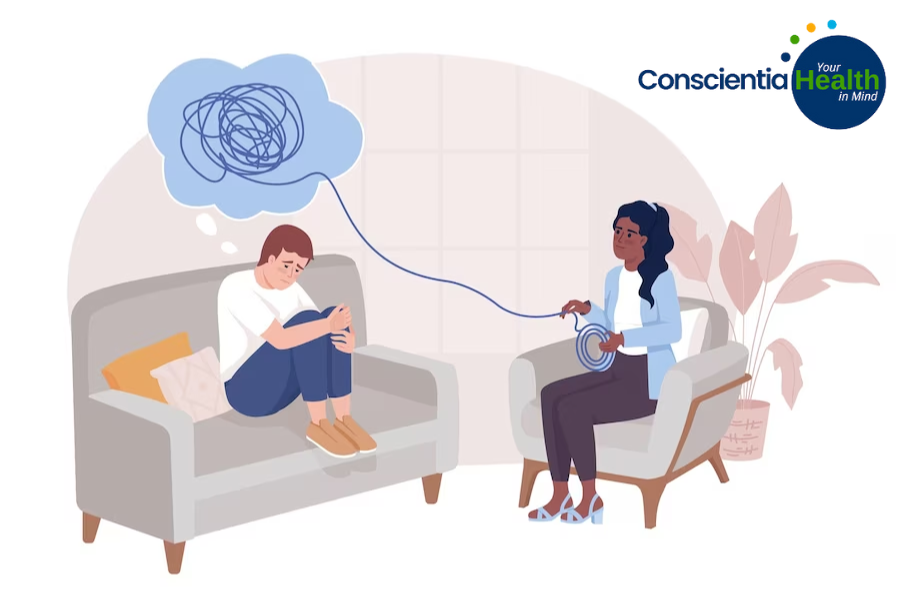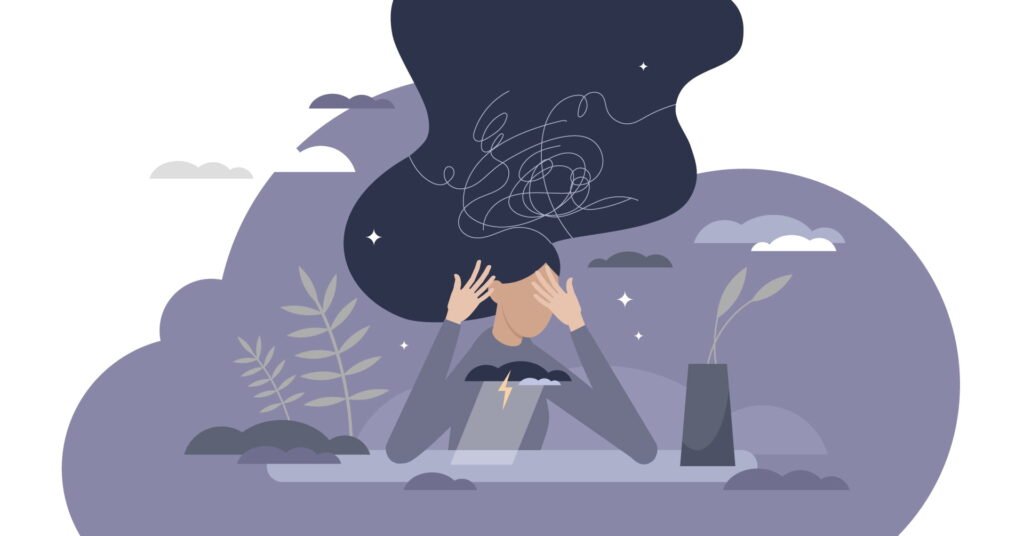Anxiety disorders are among the most prevalent mental health conditions, affecting millions of individuals worldwide. These disorders can severely impact daily life, causing persistent worry, fear, and a range of physical symptoms. If you’re struggling with anxiety, you might be wondering which treatment is best for you. In this comprehensive guide, we will explore various treatments for anxiety, their effectiveness, and how to choose the best one for your needs.
I. Introduction
Definition of Anxiety
Anxiety is a natural stress response, characterized by feelings of tension, worried thoughts, and physical changes like increased blood pressure. While occasional anxiety is a normal part of life, anxiety disorders involve excessive fear or anxiety that interferes with daily activities. There are several types of anxiety disorders, including Generalized Anxiety Disorder (GAD), Panic Disorder, and Social Anxiety Disorder.
Prevalence and Impact
Anxiety disorders are the most common mental health disorders in the United States, affecting 40 million adults annually. These conditions can lead to significant distress and impairment, impacting relationships, job performance, and overall quality of life.
II. Types of Treatments for Anxiety
Pharmacological Treatments
-
Antidepressants
- SSRIs (Selective Serotonin Reuptake Inhibitors): Commonly prescribed SSRIs include fluoxetine (Prozac) and sertraline (Zoloft). These medications work by increasing the levels of serotonin in the brain, which can help improve mood and reduce anxiety.
- SNRIs (Serotonin-Norepinephrine Reuptake Inhibitors): Examples include venlafaxine (Effexor) and duloxetine (Cymbalta). SNRIs can be effective in treating both anxiety and depression.
-
Benzodiazepines
- These medications, such as diazepam (Valium) and lorazepam (Ativan), are used for short-term relief of severe anxiety. They work quickly but can be addictive, so they are usually prescribed for short durations.
-
Other Medications
- Beta-blockers: Used to manage physical symptoms of anxiety, such as rapid heartbeat.
- Buspirone: An anti-anxiety medication that is less sedating and has a lower risk of dependence compared to benzodiazepines.
Psychological Therapies
-
Cognitive Behavioral Therapy (CBT)
- CBT is a highly effective therapy that focuses on identifying and challenging negative thought patterns and behaviors. It involves structured sessions with a therapist and practical exercises to manage anxiety.
-
Exposure Therapy
- This therapy involves gradual exposure to feared situations or objects, helping individuals confront and reduce their anxiety over time.
-
Acceptance and Commitment Therapy (ACT)
- ACT encourages individuals to accept their thoughts and feelings rather than fighting or feeling guilty for them. It promotes commitment to actions that improve and enrich life.
-
Dialectical Behavior Therapy (DBT)
- Originally developed for borderline personality disorder, DBT has been adapted to treat anxiety by helping patients manage emotions and develop coping skills.
Alternative and Complementary Treatments
-
Mindfulness and Meditation
- Mindfulness-Based Stress Reduction (MBSR) programs teach mindfulness meditation to help reduce stress and anxiety.
-
Yoga and Exercise
- Regular physical activity and yoga can significantly reduce anxiety symptoms by releasing endorphins and improving overall well-being.
-
Acupuncture
- Some studies suggest that acupuncture can help reduce anxiety, although more research is needed to confirm its efficacy.
III. Choosing the Best Treatment For Anxiety
Personalized Treatment Plans
The best treatment for anxiety often depends on individual differences. Factors such as the severity of symptoms, the presence of other mental health conditions, and personal preferences should be considered when creating a treatment plan.
Combining Treatments
A multidisciplinary approach can be beneficial. For instance, combining medication with therapy might offer more comprehensive relief. Integrating lifestyle changes and self-help strategies can also support long-term management.
IV. Efficacy and Research
Studies and Meta-Analyses
Numerous studies and meta-analyses have compared the effectiveness of various treatments for anxiety. For example, research indicates that CBT and SSRIs are both highly effective, with CBT offering longer-lasting benefits.
Long-term vs. Short-term Efficacy
Long-term management of anxiety often requires sustained efforts. While medications like benzodiazepines provide quick relief, therapies like CBT can lead to lasting changes by addressing the root causes of anxiety.
V. Access and Availability
Access to Mental Health Services
Barriers such as financial constraints, geographical limitations, and stigma can prevent individuals from accessing needed treatments. Telehealth and online therapy options have expanded access to care, making it easier for people to receive help from the comfort of their homes.
Insurance and Cost Considerations
Insurance coverage for anxiety treatments can vary. It’s essential to explore your insurance options and seek out cost-effective strategies, such as community health programs or sliding scale fees offered by some therapists.
VI. Self-Help and Lifestyle Changes
Self-Help Strategies
Practical self-help strategies can complement professional treatments. These might include journaling to track and understand anxiety triggers, practicing relaxation techniques, and building a supportive social network.
Lifestyle Modifications
Making lifestyle changes can also have a significant impact on anxiety. Eating a balanced diet, maintaining regular sleep patterns, and reducing caffeine and alcohol intake can help manage symptoms.
VII. Why Choose Conscientia Health for Anxiety Treatment?
At Conscientia Health, we understand that each individual’s experience with anxiety is unique. Our holistic approach combines evidence-based treatments with personalized care to ensure the best outcomes for our patients. Here’s why you should choose Conscientia Health:
- Comprehensive Care: We offer a wide range of treatments, including medication management, psychotherapy, and alternative therapies, tailored to your specific needs.
- Expert Team: Our team consists of experienced mental health professionals dedicated to providing compassionate and effective care.
- Innovative Therapies: We stay at the forefront of mental health research, offering the latest and most effective treatment options.
- Patient-Centered Approach: Your well-being is our priority. We work collaboratively with you to develop a treatment plan that fits your lifestyle and goals.
Conclusion
Finding the best treatment for anxiety involves exploring various options and tailoring them to your individual needs. Whether you choose medication, therapy, lifestyle changes, or a combination of these, it’s essential to seek professional advice and support. At Conscientia Health, we are here to help you navigate your journey to better mental health.
Comparison of Anxiety Treatments
| Treatment Type | Examples | Pros | Cons |
|---|---|---|---|
| SSRIs | Fluoxetine, Sertraline | Effective for long-term use, non-addictive | Side effects, takes time to work |
| Benzodiazepines | Diazepam, Lorazepam | Rapid relief | Potential for dependence, short-term use |
| CBT | Structured therapy sessions | Long-lasting effects, skill-building | Requires time and effort |
| Mindfulness Meditation | MBSR programs | Reduces stress, improves overall well-being | Requires regular practice |
| Exercise | Yoga, aerobic exercise | Improves physical and mental health | Needs consistency, may not suffice alone |
FAQs
Q1: What is the fastest way to relieve anxiety?
A: Benzodiazepines can provide quick relief for severe anxiety. However, they are typically used short term due to the risk of dependence. Mindfulness techniques and deep breathing exercises can also offer immediate calming effects.
Q2: Can lifestyle changes help with anxiety?
A: Yes, lifestyle changes such as regular exercise, a healthy diet, and good sleep hygiene can significantly reduce anxiety symptoms. These changes support overall mental health and complement other treatments.
Q3: How long does it take for CBT to work for anxiety?
A: CBT can start showing benefits within a few weeks, but significant improvement is often seen after 12 to 20 sessions. The duration may vary depending on the individual and the severity of anxiety.
Q4: Is medication necessary for treating anxiety?
A: Medication is not always necessary but can be very effective, especially for moderate to severe anxiety. Many people benefit from a combination of medication and therapy.
Q5: What should I expect in my first therapy session?
A: In your first therapy session, you can expect to discuss your symptoms, concerns, and goals with your therapist. This initial session helps the therapist understand your needs and develop a personalized treatment plan.
Conscientia Health is dedicated to helping you find the best treatment for your anxiety. Reach out to us to learn more about our services and how we can support you on your journey to better mental health.


